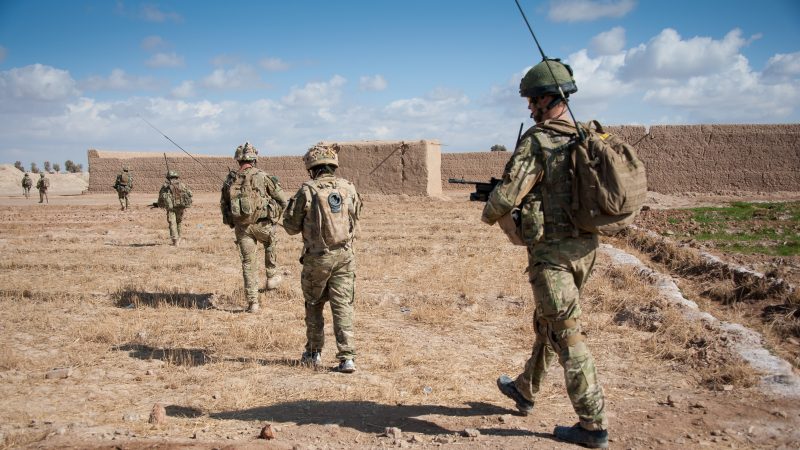
I was seven years old when the invasion of Afghanistan was launched, but as I sat in the House of Commons listening to a surreal debate about its total failure on Wednesday, one word kept coming to mind: sorry. Not that it was my fault: had I been old enough to properly understand, I’m confident I would have opposed the invasion. But because I am a representative of a political party, and a member of a parliament, that committed a terrible act that has cost a quarter of a million lives.
But in the ‘debate’ earlier this week, there were no apologies and there was little reflection. In a healthy democracy, MPs would have collectively reflected on Tony Blair’s decision to follow George W. Bush to war and discussed how to learn from it. We might even have seriously considered how to build a more just, peaceful world through a new foreign policy based on restraint and diplomacy. Sadly, that is not what happened. Far from it.
There was almost no critical assessment of the decision taken in 2001. There was near silence, too, on Britain’s involvement in the 20-year occupation of Afghanistan. The wisdom of the so-called ‘war on terror’ that has shaped Britain’s domestic and foreign policy went virtually unquestioned. One after another, MPs from across the House demanded – some implicitly, others openly – more military intervention, as if the answer to a catastrophic war was more catastrophic war.
Just as in 2001, Britain’s political class today seems almost unanimous in its belief that liberal democracy can be built at the barrel of our guns. This fantasy – which was cooked up by neoconservative fanatics in Washington in the 1990s and taken as gospel by their acolytes in London – was wildly implausible back then, as the likes of Jeremy Corbyn, John McDonnell and Diane Abbott saw well. But to hold this belief now, after all the bloodshed that was unleashed on Afghanistan, is as bizarre as it is dangerous.
That’s why I spoke in the debate. To tell a hard, but clear truth: bombs cannot build democracy and parliament must never again send soldiers to die in this futile crusade. The political class here is wildly out of touch with the British public. Polls show that more people oppose Blair’s decision to go to war in Afghanistan than support it, while just 20% of the public believe Western troops should be redeployed compared to 47% who disagree. But despite representing this mainstream view, in the chamber I was met with heckles and angry denunciations.
The truth parliament didn’t want to hear is that the war on Afghanistan has been a catastrophe. It has claimed the lives of 240,000 people, including tens of thousands of innocent Afghan civilians and 457 British service personnel. The United States poured $2tn into it, while our government spent £37bn. And Afghanistan is now one of the poorest countries in the world.
For all the talk of “nation-building”, the Afghan government was swept aside in days, its army crumbling without a trace. This collapse shouldn’t be a surprise, though. If it hadn’t been days, it would have been weeks, and if it hadn’t been weeks, it would have been a few months.
In truth, US and British forces weren’t sent to Afghanistan to build a democratic state, but to demonstrate America’s imperial might. Nor were they there to promote women’s rights, as our unwavering alliance with the Saudi and Emirati regimes attests. Not to mention that the rule of an occupying foreign military power is the antithesis of democracy, leaving little room for the emergence of popular sovereignty.
If we are not to repeat this catastrophe, it is incumbent on us to learn from it. And for all his shortcomings – about which I am under no illusion – it seems President Biden has been forced to concede the failure of this model of endless, adventurist war. Stunningly, rather than welcoming this long overdue shift in US foreign policy, leading politicians in Westminster appear confused and wounded by it, wishing they were back with Bush in 2001.
For the Labour Party, the weight of this obligation to learn lessons is even heavier. After all, it was a Labour government that first sent British soldiers to fight and die in this war. It’s time we acknowledged that the Afghans killed in this war – including the innocent men, women and children, killed by American and British bombs – were not killed for their own good. They – like British and American forces – were killed because of a failed adventurist project, whose time has long since passed.
In his time as the leader of the Labour Party, one of Jeremy Corbyn’s most powerful interventions was to apologise on behalf of the party for the Iraq War. He was right to do so. Now, as we watch horrifying scenes unfold in Afghanistan and the triumphant return to power of the brutal Taliban, it is time the Labour Party apologised for leading Britain to war on Afghanistan, too. In the wake of Blair’s hubris lies untold death and destruction. Reflecting and apologising is the least we can do.
We need a progressive foreign policy grounded in the realities of climate breakdown and a multipolar world – not, as many MPs have been advocating, another tribute act to the colonial civilising mission.




More from LabourList
‘The hope that kills you’: Reflections from the final day in Gorton and Denton
MPs, union leaders and organisations react to ‘bruising’ Gorton and Denton result
A gory night for Labour